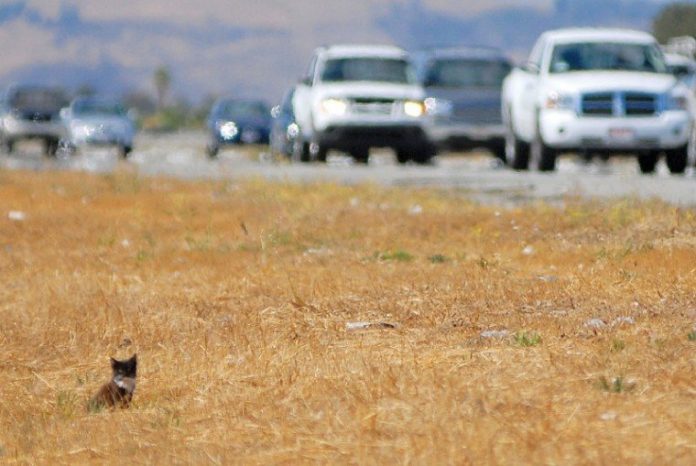Animal rights advocates say county officials are ignoring
humane, effective ways to reduce feral and stray cat populations
and are instead looking to codify a
”
trap-and-kill
”
approach.
Gilroy – Animal rights advocates say county officials are ignoring humane, effective ways to reduce feral and stray cat populations and are instead looking to codify a “trap-and-kill” approach.
A policy put forth by District 3 Supervisor Pete McHugh calls for the trapping of feral and stray cats and for their transfer to county animal shelters. While county officials say they will take pains to find homes for felines, animal rights advocates led by the county Animal Advisory Commission say the regulation, if approved, virtually guarantees euthanization for feral cats.
“This is not an acceptable ‘solution,’ said Karen Johnson, commission vice-chair and a member of the National Pet Alliance, which conducts research on animals and policies affecting them.
“Trap and kill is not what we want to see,” she said. “It doesn’t show respect for life and it’s shown not to reduce the size of colonies. What about squirrels? What about possums? We don’t round them up and kill them just because they exist.”
A letter crafted by Johnson and other members of the commission has gained endorsement from leaders of more than a half-dozen animal rights groups, including the Humane Society Silicon Valley, Silicon Valley Friends of Ferals and Towncats of Morgan Hill.
Such groups want supervisors to enact a policy that allows the estimated 100,000 cats roaming county land to live out their normal lives on public property, as long as they are neutered after being trapped. The so-called Trap-Neuter-Return approach, or TNR, helped reduce the number of animals arriving at county shelters by 20 percent in the past decade, Johnson said. She herself relied on the “attrition by colony” method to reduce a pack of 80 cats to a dozen over 10 years.
McHugh said he shares the sentiments of Johnson and other supporters, who plan to speak out against his policy when he presents it to supervisors next Tuesday morning. The supervisor said he has numerous domestic cats and cares for a colony of “fellows” in his back yard. He originally endorsed a TNR policy released by the animal commission in April, but took that policy off the table after opposition emerged among county staff and fellow supervisors.
“It is my understanding from working with my colleagues and the staff, that there is not support for a (TNR policy),” McHugh said. “That is why I am proposing what I consider a first step, with the eventual goal of getting a true Trap-Neuter-Release policy.”
Johnson said the policy idea has encountered resistance from county staff ever since it emerged more than a year ago, in response to concerns of some residents who were maintaining a colony of about 20 cats at the Reid-Hillview Airport at Tully Road and Capitol Expressway. Residents who were feeding and sterilizing the felines approached Johnson with fears that the county would trap and kill the animals.
Officials ultimately removed about 10 animals from the airport, according to Greg Van Wassenhove, director of the county’s agriculture and environmental management department. Though he could not say how many were euthanized, he explained that the county’s traditional practice involves assessing the temperament and health of felines before deciding on their adoptability. Those deemed too wild or sick are put down.
The new policy, he said, would codify that practice.
While acknowledging the potential benefits of the TNR method, Van Wassenhove said that “the county, by virtue of allowing the existence of those cat populations on county property, would be proactively maintaining those populations and therefore would be liable for any public health and safety issues that result.”
Van Wassenhove and other officials have suggested that an agency facing a $227-million budget deficit has no spare cash to manage colonies of wild cats.
District 1 Supervisor Don Gage could not be reached for comment. He recently said that he opposes the idea of managing cat populations on public land, and questioned the wisdom of maintaining a colony at Elmwood Jail, the only county-owned property where felines are not trapped and sent to shelters.
Supervisors will debate McHugh’s policy Tuesday at 9:30am. The meeting will be held in the board chambers at the County Government Center, 70 West Hedding St., San Jose.
Serdar Tumgoren covers county government for the Times. Reach him at 779-4106 or st*******@**********rs.com.














